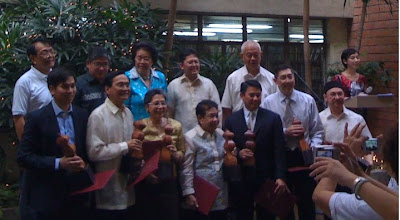



UP College of Business Administration Homecoming
December 4, 2010
(bottom photo: Dean Velasco, Chancellor Cao, UP President Román, Mrs. Brown, Dean Ben Paul Gutierrez, Dean Virata.)
Congratulations, and Thank You, Annabelle! :-)






People volunteer for a wide variety of reasons, especially wanting to help others. But it's also OK to want some benefits for yourself from volunteering.
Some people are uncomfortable with the notion that a volunteer "benefits" from doing volunteer work. There is a long tradition of seeing volunteering as a form of charity, based on altruism and selflessness. The best volunteering does involve the desire to serve others, but this does not exclude other motivations, as well.
Instead of considering volunteering as something you do for people who are not as fortunate as yourself, begin to think of it as an exchange.
Consider that most people find themselves in need at some point in their lives. So today you may be the person with the ability to help, but tomorrow you may be the recipient of someone else's volunteer effort. Even now you might be on both sides of the service cycle: maybe you are a tutor for someone who can't read, while last month the volunteer ambulance corps rushed you to the emergency room. Volunteering also includes "self-help." So if you are active in your neighborhood crime watch, your home is protected while you protect your neighbors' homes, too. Adding your effort to the work of others makes everyone's lives better.
Your Motivations
Think about how much you receive when you give and consider why you want to volunteer. You may have several different reasons. Here are just a few of the many possible motivations identified by other volunteers:
You will probably have some special reasons of your own. Remember that the motivations you have to select the place to offer your services may not be the reasons why you stay. Once you're on the volunteer job, you will continue to serve as long as you feel that your efforts are accomplishing something, that your talents are appreciated, and that you make a difference. And if you also like the people with whom you work, so much the better!
As long as you are truly serving through your volunteer work, isn't it wonderful that such an exchange occurs? In fact, it tends to strengthen your commitment to volunteering when you can see the benefits to both the recipient of your efforts and to yourself. And it is much more comfortable than "charity" because it upholds the self-esteem of those with whom you volunteer.
A longer version of the list of motivations for volunteering can be found in The Volunteer Recruitment (and Membership Development) Book by Susan J. Ellis.
--o--o--o--
Info about 'Alalay sa Pamilya at Bayan Foundation'

Here’s the account of St Josemaría’s death: On June 26, 1975, Msgr. Josemaría died suddenly in Rome. The previous month he had made his last visit to Spain, where he received the gold medal of his native town, Barbastro, and visited the nearby shrine of Torreciudad, which had been built at his request, and was about to be inaugurated. His death marked the end of the foundational stage of Opus Dei and, in the words of his successor, the beginning of the “stage of continuity and fidelity”. Msgr. Alvaro del Portillo, then Secretary General of Opus Dei, acted as its head until the elective congress was held. (Excerpts from Immersed in God: Blessed Josemaría Escrivá, founder of Opus Dei, as seen by his successor Bishop Alvaro del Portillo)
VIDEO: A selection of images from the Holy Masses celebrated on the liturgical feast of St Josemaria.




 Among the many things that she is famous for, Mrs Brown is known for sending girls to train at some of the Foundation for Professional Training, Inc. (FPTI) Schools.
Among the many things that she is famous for, Mrs Brown is known for sending girls to train at some of the Foundation for Professional Training, Inc. (FPTI) Schools.
Román and U.P. Diliman Chancellor Sergio Cao. The event was organized by
BSP Governor Amando Tetangco gave the response for the BSP Chairs. In his response for the presentation of the Annabelle Pizarro-Brown Centennial Professorial Chair, Mr. Walter Brown said, among other things, that he thought the funding of the Chair in behalf of his wife was a bright idea for the following reasons: (1) that it was a perfect tribute to a wife while she is still living [the naming of streets or buildings after a specific person can happen only when that person is already deceased]; (2) it’s a great way to “pay back” to the University that has nurtured us and trained us for leadership positions in society; (3) it has the direct benefit of funding the research of the U.P. Faculty members [to whom the Chair will be assigned].
*My ulterior motive for writing out this blog is that I’m personally hoping that the Annabelle Pizarro-Brown Centennial Professorial Chair could be assigned to me, for my research in the area of Business Ethics :-) Please help me pray for this intention. [I was so lucky to have been asked by Dean Echanis to emcee that event!]
—o—o—o—o—o—
What are “Professorial Chairs”?
http://www.upd.edu.ph/~cba/admin_BRF.htm
http://fupfa.com/professorial-chairs-and-faculty-grants/
Professorial chairs and faculty grants help advance education and research by providing supplemental resources to faculty members in their teaching and research endeavors. A chair may be established with an endowment fund to be managed by a given Foundation (in the case of the Brown Chair, the endowment is lodged with the UP Foundation). The income from the fund shall provide financial support to a deserving faculty member of the University. Professorial Chairs may be named in honor of illustrious alumni or prominent representatives of private business and public management sectors. The chairs may also carry the name of the company sponsor.
Are you an illustrious alumnus/-a of the U.P.? Would you like to make a donation toward the endowment of a given Professorial Chair?
—o—o—o—o—o—


